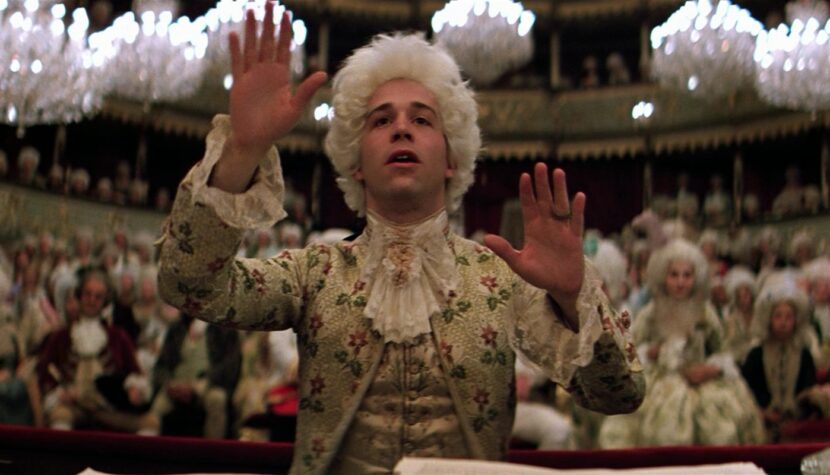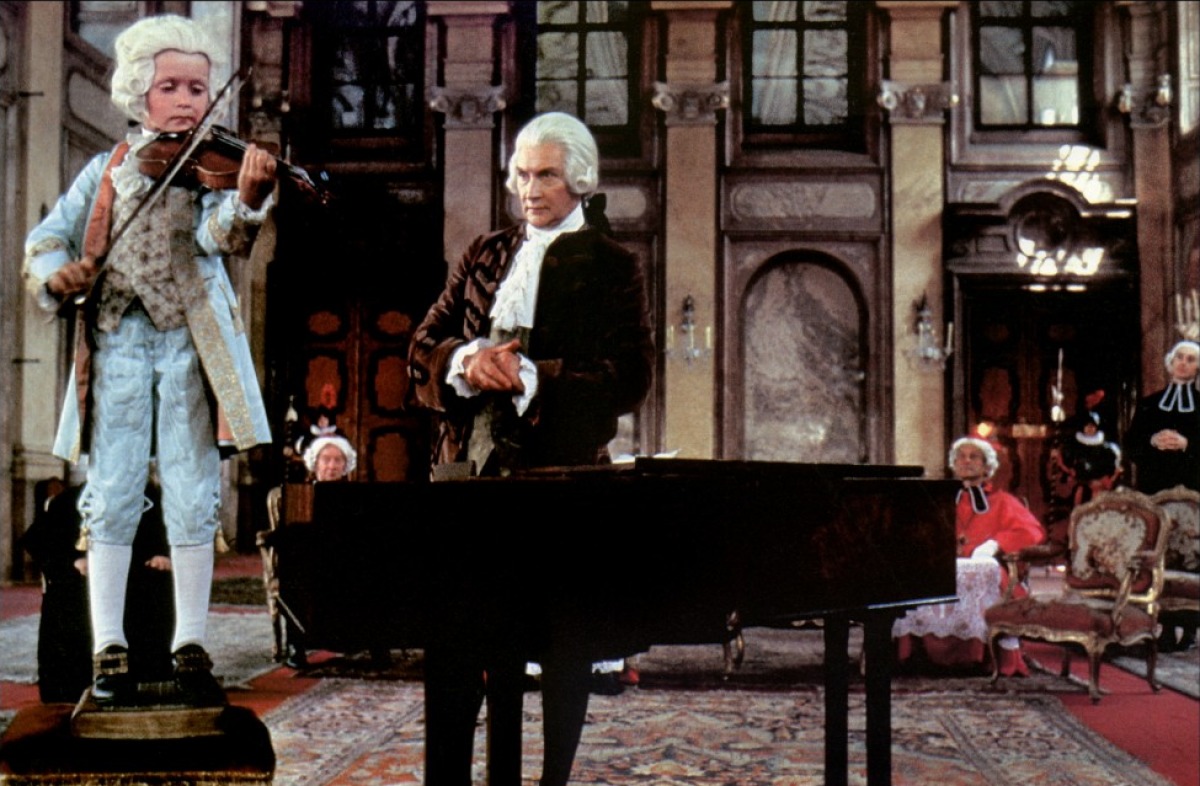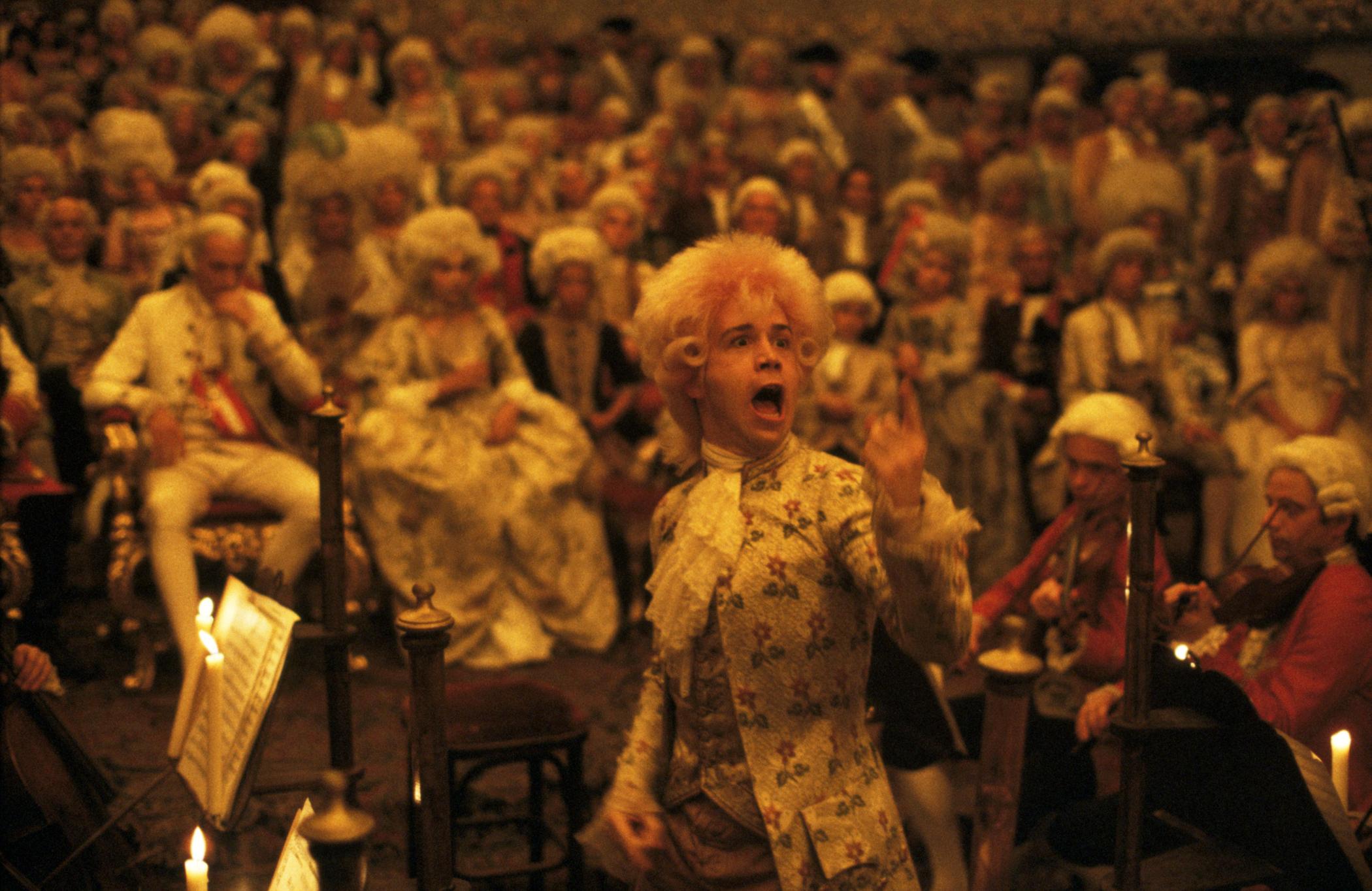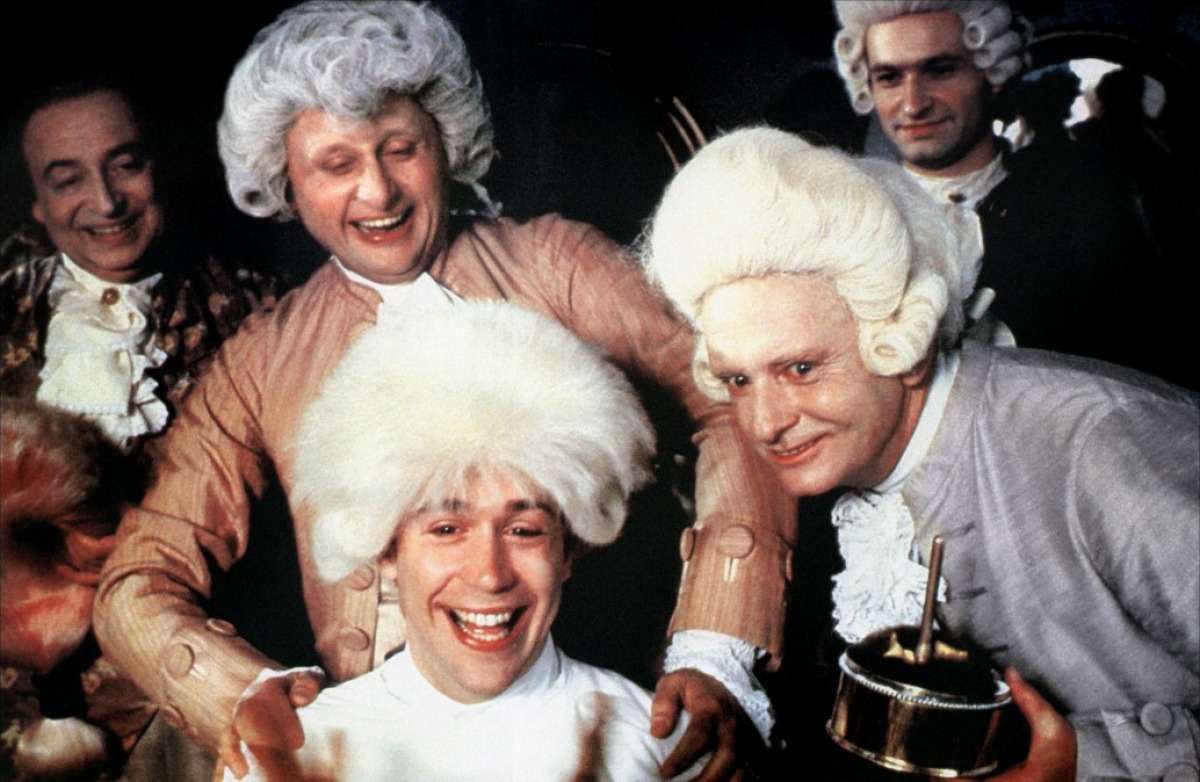AMADEUS, or loved by God. Milos Forman’s masterpiece explained

A young priest comes to minister to a would-be suicide victim. He wants to bring him the word of God, forgiveness and consolation, in accordance with the dictates of her vocation and religion. He was told to go among the lost, lift the brokenhearted, convert the lost, and show the light of truth to sinners. He goes with the message of God’s love and goodness to the insane asylum – people imprisoned, isolated, stripped of all dignity, degraded, chained like animals. However, he will hear a confession that goes beyond the framework of his simple faith, which cannot be measured by the measure of mercy and forgiveness. He will listen to stories of anguish, struggle, passion and envy, only to realize that he cannot find an answer or an explanation, that his contentment as an enlightened priest has been shaken to its foundations.
Salieri

God chooses his messengers according to rules we do not know or understand. And although he calls many to his service, only a few can speak with his voice. What key the Almighty uses to choose them, only He knows. Antonio Salieri – wasn’t he most suited to this role? Wealthy, respected, honored by the wealthiest, ready to sacrifice everything to the Lord in the name of his vocation – his work, passion, innocence. On the other hand, Wolfgang Amadeus Mozart – what does he represent? A rake, a play-lady, a simpleton, no refinement, no culture, the terror of elegant salons, rolling carelessly on the floor at the moment when he should humbly bow his head before the face of his protectors. Piercing laughter and unbearable lack of manners. Yet it was him Heavens had chosen to speak with their voice. Though he didn’t ask for it, though he didn’t want it, while Salieri’s daily prayers, sacrifices, sacrifices, and supplications bring no response. If only God had been silent – but no. He laughs at his servant. He mocks him by crossing his fate with that of Mozart, giving him the curse of being the only one who knows what genius came to Vienna with Mozart. He gave him enough intuition to see greatness, but not enough talent to become great himself. What could be worse than every day, again and again, to witness your defeat, the incomprehensible perversity of fate?
These Supreme Powers, to whom Salieri wanted to entrust himself and to whom he wanted to devote himself, mocked him doubly. They had given him a tool whose power he could not resist. He could not pass by indifferently the temptation that could become the way of his redemption, and in the end – because he turned out to be weak, but with understandable very human weakness – condemned him to damnation. He had power in his hands and he used it, and he paid for it to the end, all the long years after his adversary had long since been laid to rest in his grave.

Sometimes the worst thing that can happen to a person is that their prayers are answered. The answer to prayers can be at the same time consistent with the request and contrary to the expectation. Salieri could achieve what he wanted. If he stood above the rage he felt, if he got rid of envy towards the one who took everything he wanted without effort and without a conscious act of will, if he humbly bowed his head accepting his place in the line – he would have a chance to go down in history as the one who recognized and extracted the pearl, who supported the genius on his way, who endorsed his achievements and opened more gates for him – a quiet gray eminence, about whom someone may someday say with appreciation and admiration “we owe him Mozart!”. But the human limitations he would have to jump over were too strong. He couldn’t. He did not choose this path. He followed a different, disastrous path of revenge and challenge to God. And on this road there was no place for him to win.
Mozart

Mozart does not even know what kind of enemy he has – and why this man is hostile to him – and he himself, yes, is aware of his value, maybe even vain, but he does not seek the sources of his power in divine interference. Music is the essence of his life. He composed as a teenager, when his peers carelessly played war, he played at courts and organized concerts for the Pope himself. His works flowed down to the paper without a single mistake, a single slip, a single false note. He heard them and recorded them as they should be. He made no corrections or copies. He could play with his eyes closed, from end to beginning, from any note, in any style, in any arrangement. At the same time, however, he cannot shake off the overwhelming influence of his strict father, with whose criticism and resentment he cannot reconcile, he is drowning in debt, unable to cope with the practical side of life, money slips through his fingers, he delights in endless games, unbridled carousing, the company of people of the lower class. And he is ahead of his time. He is definitely ahead of it, listeners are not mature enough to fully perceive his music and perceive the depth of his perfection.

Only Salieri, like an evil spirit, like an avenging angel, sees, understands, comprehends. And circumstances help him more than he could wish for. Where others see talent, he sees genius. Where others see genius, he sees the work of God. He takes advantage of the shortsightedness of the powerful, of the blindness and indolence of the so-called “society”, of the fact that mediocrity always criticizes what it cannot understand. There is only one thing he cannot prevent – that Mozart speaks so easily to those who perceive his work with heart and intuition (Schikaneder says bluntly: “If you staged Don Giovanni here, you would achieve a great success”). Step by step, piling up obstacles, finding difficulties, throwing logs under his opponent’s feet – while hiding behind the mask of a friend, confidante, full of understanding and willingness to help – Salieri gains full power over Mozart. However, manipulation is no longer enough for him. One basic fact keeps him awake at night – that Mozart, lonely, drowning in debt, seizing any chance of earning money, drinking from morning to night in depression – is still an absolute artist. And that means the time has come for the final blow, for the final act of this grim tragedy of human passions.
Requiem
His funeral! Imagine it, the cathedral, all Vienna sitting there, his coffin, Mozart’s little coffin in the middle, and then, in that silence, music! A divine music bursts out over them all. A great mass of death! Requiem mass for Wolfgang Mozart, composed by his devoted friend, Antonio Salieri! Oh what sublimity, what depth, what passion in the music! Salieri has been touched by God at last. And God is forced to listen! Powerless, powerless to stop it! I, for once in the end, laughing at him!
That’s what he wants to do. Mozart will write a funeral mass for himself. Speaking with the voice of God, as decreed from above. And Salieri would oppose it, thwart these plans, erase the name of the chosen one, call himself the author of a brilliant work, and God would watch, powerless, unable to do anything. His voice… called… Salieri! God will finally grant the request he has denied for so long. One way or another, He will be forced to answer the pleas that have been brought before Him for so long and so stubbornly.
That’s how far Salieri went. His blindness is complete, he no longer sees clearly, he cannot make a rational judgment. He wants to achieve his goal at any cost. He forgets, or maybe he just doesn’t want to remember, that no one has ever won against God. He thinks he has every right to win. Was he not refused when he humbled himself and pleaded? Has not the meaning of his most self-sacrificing, heartfelt work been called into question? Was he not considered unworthy, wronged, denied all reason? Doesn’t that give him the right to scream and demand justice? Thanks to Mozart… the man he loved and hated the most in the world, he wants to make amends for his harm and repair the evil he suffered from Heaven.

Salieri appears in Mozart as a messenger. In a mask that symbolizes the duality of life, laughter and despair, Heaven and Hell, mercilessly exploiting the deepest fears of the enemy, assign him a task. Now all that remains is to wait for Requiem, a complete, perfect work, to see the light of day. And to collect his reward, for which he has waited for so many long, empty, bitter years.
One of the greatest musical works of all time required a great deal to be perfect. It fed on not just anything, because not only talent and work, but life itself. It sucked vitality, energy, all strength from its creator. It brought him death. For it is a record of the greatest mystery of salvation, redemption, faith, captured in notes, a field where the most primal creative forces clash, darkness and light in one, condemnation and purification, there are the powers of hell and angelic choirs in it. Such fullness of enlightenment is paid with life.

This last clash illustrates the order of their lives. Salieri – an impersonator, scribe, observer, whose participation in the work comes down to admiration. Mozart drenched in sweat, tormented by fever, listening to the music sounding in his head, although not yet put into notes, it is already alive, existing. He’s in a hurry, he doesn’t have much time left. This moment of Requiem is a plea of a repentant sinner to free him from the group of the damned, for the salvation of the soul, for the forgiveness of wickedness. A plea for mercy. The perversity of this scene is striking – for the dying Mozart, this phrase is both a confession and a last prayer, and its confidant is the one who doubted God’s mercy a long time ago. However, he gets carried away. Seemingly only by the beauty of music, because when Mozart’s question about eternal fire was associated with the heat of hell’s flames, Salieri expresses his faith with full conviction – but in the eternal flame of undying passion. He is not aware that he is witnessing a message born from a soul suspended on the border of two worlds, that his fate is completed simultaneously with that of Mozart. He is fascinated by the very act of creation. At the moment, however, he is already condemned – he will not be able to sign his name under the confession of a repentant sinner appealing to God’s grace. He is only a transmitter, a passive listener. He expresses no will. He only records: the dark choir of the damned, hellfire, the bitterness of sin, the sadness of penance, the harmony of creation, the power of majesty, and finally a gentle calm that turns into a sweet melody of forgiveness and kindness. Mozart’s confession ended and was heard. His journey has come to an end.
Lacrimosa…” That day, drenched with bitter tears, on which a sinful man will rise alive from the dust of the earth to be judged.” However, Lacrimosa no longer applies to Mozart. He can rest, Salieri will have to cry his bitter tears alone. Still, the time has not yet come when he will fully realize how God has responded to his manipulation. And what cross will he have to bear:
– I’m so ashamed.
– Why?
– I thought you didn’t care about my job, and that you didn’t care about me either. Forgive me.
Death

Mozart was buried in a mass grave for the poor. Requiem remained unfinished, there was no one who would be able to undertake the work in the same spirit, to bear the enormity of this task. Salieri is left with the burden of his guilt. He did not kill Mozart and take over his inheritance as he wished to do. However, he feels guilty about the crime. It poisoned his life. He broke them and strangled them. And it took many years for him to understand that they were both victims of the same God who uses his messengers and then rejects them. Geniuses or mediocrities – they are all just toys created for the delight of the Supreme. Such is His mercy. Salieri rejects the comfort that the priest wanted to bring him – the priest is unable to console him, all the power of his religion is powerless against a man who does not want forgiveness and does not want to forgive. The immortality born of shame, disgust and crime is, in Salier’s eyes, nevertheless better than what God could offer him in his capricious grace. Mercy does not exist where greatness is accompanied by suffering and loneliness, and mediocrity is accompanied by honors. It does not exist where the desire for perfection is a fault, and perfection itself is a blessing for which one has to pay. If our mediocrity is to make us the laughing stock of Heaven, then who should ask forgiveness from whom?
Mediocrities everywhere… I absolve you… I absolve you… I absolve you… I absolve you… I absolve you all.

